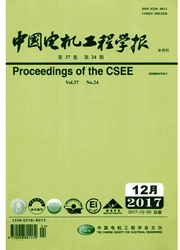

 中文摘要:
中文摘要:
模块化多电平换流器(modular multilevel converter,MMC)直流输电技术相比于传统直流输电更适用于向弱交流电网供电。该文建立MMC联接低短路LL(short circuit ratio,SCR)交流电网系统小信号模型,重点研究联接弱交流电网MMC系统与电压源换流器(voltage source converter,vsc)系统之间的稳定性差异;该文同时首次建立MMC联接低转动惯量的发电机系统小信号模型,研究交流电网惯性对系统稳定性的影响。采用特征根分析法和参与因子分析法对小信号模型进行分析,得到影响联接弱交流电网MMC系统稳定性的关键因素。最后,在PSCAD/EMTDC中搭建201电平联接弱交流电网MMC系统仿真模型,仿真结果验证了小信号模型的准确性。通过理论分析与仿真验证共得到两个结论:1)当SCR极低、交流电网极弱时,锁相环(phase-locked loop,PLL)控制器参数与子模块电容相互影响导致联接弱交流电网MMC系统易发生高频失稳;2)较小的交流电网转动惯量与外环控制器会发生相互作用,导致联接弱交流电网MMC系统小信号失稳,而通过优化外环控制器参数能够提高系统稳定性。
 英文摘要:
英文摘要:
Compared with the current source converter, the modular multilevel converter (MMC) is more suitable to connect to an extremely weak AC system. This article established a small-signal model of MMC integrated into weak ac system with low short circuit ratio (SCR) and low inertia. The stability difference between MMC and VSC was studied. And the impact of ac system inertia on system stability was investigated. By eigenvalue and participation factor analysis, the factors which have the most influence on the small-signal stability of MMC were proposed. Thereafter, 201-level MMC models connected to ac system with low SCR/inertia were established in PSCAD/EMTDC. The small-signal model was verified by the simulation results. Two conclusions were drawn in this article. First, the interaction between sub-module capacitance and PLL leads to a high frequency oscillation of MMC integrated into weak ac system with extremely low SCR. Second, the low inertia of ac system can also lead to unstable of MMC controller, especially the outer-loop control parameters. Reducing the responding speed of outer-loop controller can enhance the system stability assessment.
 同期刊论文项目
同期刊论文项目
 同项目期刊论文
同项目期刊论文
 期刊信息
期刊信息
